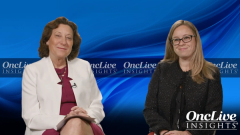
Opinion|Videos|April 10, 2024
5-Year Data from the MonarchE Trial Investigating Abemaciclib in HR+, HER2- High-Risk, Early Breast Cancer
Hope Rugo, MD, FASCO, and Naomi Dempsey, MD, provide an in-depth analysis of the randomized phase III monarchE trial, which focused on Abemaciclib in high-risk early-stage HR+, HER2- breast cancer, offering insights into recurrence rates, progression-free survival, and distant disease-free survival outcomes for patients.
Advertisement
Episodes in this series

This OncLive Insights video series was supported by an independent sponsorship from Eli Lilly. Eli Lilly had no input into the content or development of this OncLive Insights video series. Content was independently developed and published by OncLive.
Advertisement
Latest CME
Advertisement
Advertisement
Trending on OncLive
1
Long-Term Cilta-Cel Data Show Low Rates of PFS Events in Standard-Risk R/R Myeloma
2
Nonresponse to Bridging Therapy and Peak ALC After Cilta-Cel Are Associated With Neurotoxicity, NRM in Myeloma
3
FDA Underscores Risks Associated With DPD Deficiency and Capecitabine/5-FU Use in Cancer Care
4
FDA Updates Axi-Cel Label to Remove Limitation of Use in R/R PCNSL
5




































